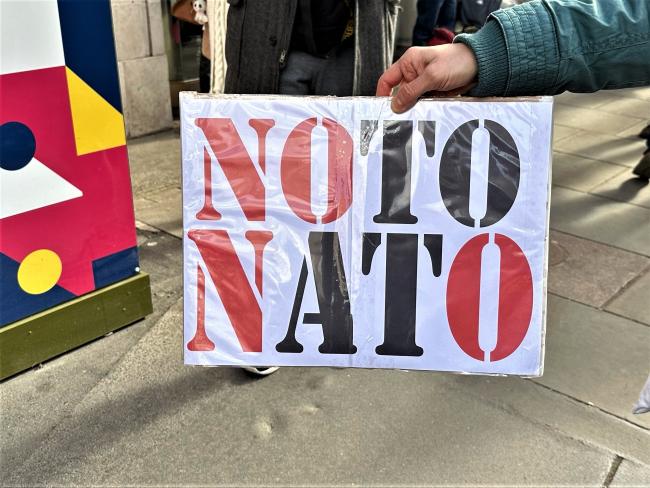9 April 2024

Peace march placard, London, February 2023. Photo Workers.
On 19 January this year the chairman of NATO’s Military Committee Rob Baur from the Netherlands said that the governments and populations of NATO member countries should ready themselves for a larger war with Russia. This, he said, would demand a major large scale mobilisation of the populations.
The following week General Patrick Sanders, the departing head of the British Army, dutifully raised the possibility of conscription here in Britain. The NATO marching orders were hailed by politicians such as the former Prime Minister Boris Johnson.
Conscription
And then while visiting Britain in March, Latvian foreign minister Krisjanis Karins said that Britain should increase its military spending along with conscription. This was a few days before he had to resign over alleged misuse of public money.
Recently the French president Emmanuel Macron is increasingly making pro-war, get tough public statements. And on 29 March Donald Tusk, prime minster of Poland, claimed that Europe has entered a pre-war era.
But having pitched the notion of conscription and taken discreet soundings, the NATO narrative then changed on 4 April. Attending a meeting of NATO foreign secretaries to mark the organisation’s 75th anniversary, David Cameron said “no” when asked whether Western nations should send troops to Ukraine.
‘Cameron judged British workers would not be willing to fight in Ukraine.’
Cameron said that fundamentally this is a question of political will – but called for continued military and political support for Ukraine. Clearly his political judgement was that most British workers would not be willing to be sent to fight and die in in this war.
The NATO foreign ministers went on to agree that NATO member states should be compelled to make military and financial aid to Ukraine mandatory. For now, they seem to have accepted that goading countries into conscription isn’t going to work.
Imposed
Compulsory contributions amount to a tax imposed on British workers and those of all NATO states, which will reduce living standards and undermine essential services that are short of funds.
The NATO narrative coming from the British ruling class must be routed. It’s time to remove the NATO albatross that has been tied around our necks for 75 years – and while we are about it, to change the way things are done in Britain.
Change needed
An example of what needs to change came about shortly before NATO issued its marching orders in January. Prime minister Rishi Sunak authorised another £2.7 billion for Ukraine, just before the announcement of the proposed closure of the Port Talbot steel plant.
And while British workers’ real wages fell further in 2022 than in any year since the 1950s, the British government has introduced legislation attempting to prevent workers taking effective strike action for better pay.
Distraction
Those who talk about the need to join a war that has nothing to do with British workers also attack our living standards, close our major steel works and pass legislation to neuter strike action. So for them it is war abroad to distract workers from the domestic economic war being waged against them at home.
‘Workers have to turn the spotlight and bring the narrative back home – what does Britain need?’
Workers have to turn the spotlight and bring the narrative back home – what does Britain need? The more that the weakness and class hatred of our rulers becomes apparent in their domestic policies, the more their foreign policies will come under pressure from the British people.
After five waves of expansion following the fall of the USSR, NATO at the end of 2021 found itself on the borders of Russia. NATO describes this forward movement as “defence”. Predictably this stark provocation served to detonate a Russian reaction. In turn that was countered by NATO creating a self-defence narrative packaged and marketed as deterrence.
Ditch nonsense
From a British working class standpoint it is time to ditch this nonsense and clearly say that when we voted for Brexit we didn’t vote for war manoeuvres or for the type of domestic economic orthodoxy that over the years has brought Britain so low.
As a working class we should decide who our enemies are, and they are much closer to home than Russia.
